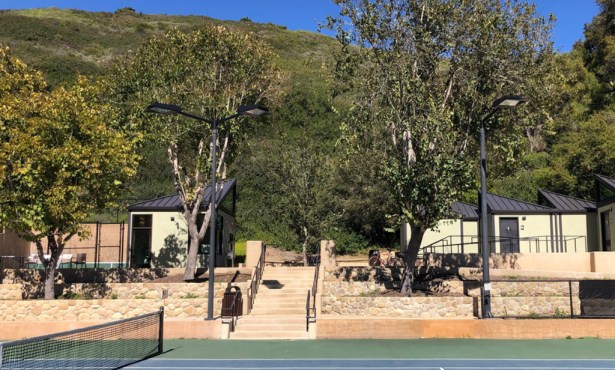It’s a Grand Ol’ Flag
Tuesdays at Eight
At the Lobero Theatre, Tuesday, July 4.
Reviewed by Gerald Carpenter
This American concert began, naturally enough, with Wolfgang
Mozart (Piano Quartet in G Minor, K. 478) and Darius
Milhaud (Quatre Visages for Viola and Piano, Opus 238).
Although the Constitution had been around for four years when
Mozart died, he never made it to our shores, but his great
librettist, Lorenzo da Ponte, ended his days in New York, teaching
Italian at Columbia. The unmistakably French Milhaud spent much of
his life on this side of the Atlantic — first, during World War II,
in the French Embassy in Brazil, and then as a professor at Mills
College in Oakland, as well as serving as honorary music director
of the Music Academy from 1948 to 1951.
The program became emphatically American — if not yet
Americana — with the next piece, Richard Lavenda’s entertaining
Chiaroscuro, performed by flautist Timothy Day, bassoonist
Benjamin Kamins (for whom it was written), bassist Nico Abondolo,
and percussionist Michael Werner. Lavenda was on hand for the
performance and was patently delighted, as was the audience.
Now we come to the heart of the matter — the three composers
whose works represent, for me, some of the best that American music
has to say for itself: George Antheil, Lukas Foss, and Samuel
Barber.
Antheil’s Sonata No. 2 for Violin with Piano and Drums
was performed by violinist Jeff Thayer and pianist (and drummer?)
Warren Jones and made no doubt the strongest impression of any work
of the evening. So ’20s in its cheeky combination of disparate
styles and themes, so ebulliently anarchistic in its
self-destruction, the Sonata is an excellent example of
Antheil’s “bad boy of music” persona, but gives no hint of the
great romantic nationalist to come. Thayer’s patient virtuosity
made him a perfect straight man to Jones’s spontaneous
slapstick.
Lukas Foss’s Three American Pieces, which followed the
intermission, was a much more straightforward bit of homegrown
loveliness — the melodies American in spirit, but not, I think,
quotations — with plenty of (musical) fireworks at the end.
Violinist Kathleen Winkler and pianist Anne Epperson make a dream
team.
Finally, I can scarcely believe that soprano Rena Harms is a
student at the Academy, so poised and exquisite was her singing of
Samuel Barber’s incomparable setting of James Agee’s Knoxville:
Summer of 1915, yet the program claimed her as an “academy
young artist,” so I must take them at their word. Neither Harms nor
the wonderful ensemble, conducted by Warren Jones, batted an eye
when the fireworks began in earnest halfway through the song. Talk
about shock and awe!



